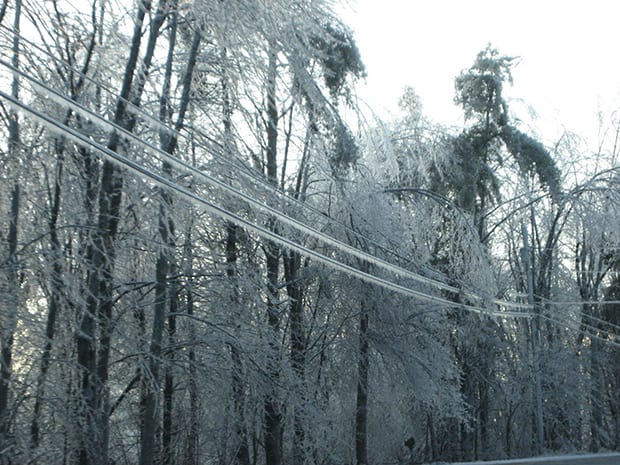E.ON Debuts ‘Resilience-as-a-Service’ for Remote Markets
The post E.ON Debuts Resilience-as-a-Service' for Remote Markets appeared first on POWER Magazine.

German energy supplier E.ON is collaborating with UK energy firms Scottish and Southern Electricity Networks (SSEN) and Costain Group to roll out an innovative business model that monetizes resilience and grid stability services to remote areas.
E.ON Innovation, one of Europe's largest distribution system operators (DSOs) and the transmission and distribution arms at SSEN and Costain on July 22 announced they had begun a Resilience as a Service" (RaaS) project. The effort seeks to accelerate the energy transition by enabling a greener and more resilient energy supply in rural areas, and its main goals include maintaining power supplies in rural and remote areas through an innovative combination of energy storage and local renewables, the groups said.
As E.ON explained to POWER, Europe's power systems are on course to dramatically shift away from a one-way conventional generator-to-consumer system and toward a multi-pronged, two-way system that includes vast amounts of distributed renewable generation, as well as electrification of mobility and heating. But to ensure all regions maintain reliable power supplies, this will require a significant amount of investment in grid infrastructure," it said.
However, some regions-in particular remote areas such as islands and sparsely populated rural communities-may not embrace the necessary upgrades to legacy systems because upgrades are not economical, or the regions face technical and physical barriers, E.ON said. For example, in the UK, many rural areas are supplied by a single electric line, which can result in an above-average number of outages."
The RaaS project will attempt to bridge this gap" by developing a solution that provides both resilience and grid stability services to network operators at an affordable price and high value for the local communities, which can benefit from reliable and more affordable clean power," the company said.
First Demonstration Planned in ScotlandAccording to the partners, the RaaS project, which kicked off in January, will span four years. Over the next year-until mid-2021-E.ON, SSEN, and Costain plan to work out technical and commercial development details of the new solution. After that, they will focus on building and operating a pilot project. The first demo-site will be installed in a remote location in Scotland, showcasing the solution and providing learnings. Starting in 2022, scaling to other sites is planned," E.ON said.
A key aspect of the pilot will be to establish an innovative battery energy system that can re-establish a village's power supply in case of an outage. The solution will essentially leverage local renewable energy assets to provide power until the distribution network operator can correct the problem. Along with battery storage and local renewables, it will also entail smart grid controls, flexibility services and new commercial models," E.ON said.
However, as SSEN and Costain pointed out, the new market solution could also reduce or defer costly future network reinforcements." The companies are gearing up for the possible connection of large volumes" of electric vehicles, heat pumps, PV panels, and potentially significant volumes of storage, which they claim will radically alter long-established and consistent demand patterns." Costs are important because increased peak network loading drives investment, the cost of which will fall to network customers," they said.
As significantly, a RaaS project could also pare down the use the existing carbon-intensive standby generation. Traditional resilience options such as traditional network reinforcement or diesel-powered generators are not only costly to own and operate but also have a significant environmental impact," the companies noted.
While alternatives such as microgrids and islanding" are emerging, their integration hasn't yet been technically proven at scale. Small-scale deployments to date have all been bespoke customised solutions, delivered at a price point which is too expensive for wide spread adoption. Moreover, there is no proven business model in [Great Britain] for [distribution network operators (DNOs)] to access these services or a clear needs case for service providers to create the solutions."
Among challenges the partners will need to overcome to create a business case for the widespread adoption of a large-scale RaaS model are a validated set of requirements" that will allow DNOs to procure the type of service desired. They will also need to establish technical standards in particular in key areas such as earthing and protection." There is also currently no market information available to potential service providers to allow them to consider this potential service when developing their projects," the partners said.
A Distribution Network QuestStill, as Luis Hernandez, head of Innovation, Energy Communities and Networks at E.ON Innovation, noted, a key aspect of the RaaS project is that it spearheads forward-thinking collaborations and exchange of key expertise," which he said will be necessary to achieve a faster and more affordable energy transformation.
For instance, in Simris, Sweden, we installed an innovative energy system, which can run on up to 100% locally produced renewables. Through that, we generated the necessary know-how to understand how battery systems and community solutions can achieve a faster and cheaper energy transition," Hernandez said. We apply this knowledge in RaaS to support SSEN in enabling their customers to benefit from their current and future locally installed renewable plants." The project also builds on DNO Northern Powergrid's Microresilience project, which is investigating the use of innovative power electronics combined with storage and renewable generation to provide improved network resilience for rural and other remote customers.
A document the partners submitted to the UK Office of Gas and Electricity Markets (OFGEM) last year suggests the four-year RaaS project will cost up to 16.5 million ($21 million). In December 2019, the companies successfully bid into OFGEM's Network Innovation Competition to secure 9.5 million in funding for the project.
-Sonal Patel is a POWER senior associate editor (@sonalcpatel, @POWERmagazine).
The post E.ON Debuts Resilience-as-a-Service' for Remote Markets appeared first on POWER Magazine.